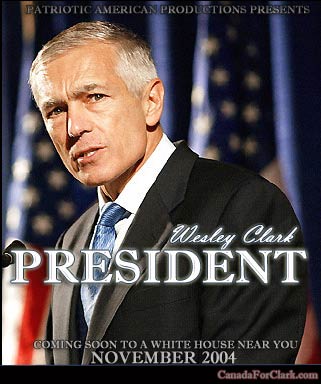
Yeah, slut, he looks awful in a suit.
Trying to soften his military image and lure more
female voters in New Hampshire, Gen. Wesley Clark switched from navy suits
to argyle sweaters. It's an odd strategy. The
best way to beat a doctor is not to look like a pharmacist.
General Clark's new pal Madonna, (What
a slut! Clark has never met Madonna.) who
knows something about pointy
fashion statements, should have told him that
those are not the kind of diamonds that make girls swoon.
Is there anything more annoying than argyle? Maybe Lamar Alexander's red plaid shirt. Maybe celebrities sporting red Kabbalah strings.
After General Clark's ill-fitting suits in his
first few debates — his collars seemed to be standing away from his body
in a different
part of the room — a sudden infusion of dandified
sweaters and duck boots just intensifies the impression that he's having
a hard time adjusting to civilian life.

Yeah, slut, he looks
awful in a suit.
It's also a little alarming that he thinks the
way to ensorcell women is to swaddle himself in woolly geometric shapes
that conjure up images of Bing Crosby on the
links or Fred MacMurray at the kitchen table.
"I think there's an impression that the armed
forces is a male-dominated, hierarchical, authoritarian institution," he
told The Times
about his gender gap, notwithstanding the fact
that the armed forces is a male-dominated, hierarchical, authoritarian
institution.
After his rivals jumped on him for trading hats with the Bosnian war criminal Ratko Mladic in 1994, you'd think he'd stick to his true gear.
His own Army camouflage — a material modish in
the last few years in everything from bras to cargo pants to grenade-tossing
Madonna videos — would have caused more of a
frisson in female voters than country club plaid. (After all, the president's
harnessed "Top Gun" costume set Republican female
hearts aflutter.)
On Thursday, eight reporters and three minicams
trailed the general as he sweater-shopped at L. L. Bean in Concord, N.H.
Chris Suellentrop filed a fashion dispatch in
Slate that the Democratic candidate tried on "a plain, green, wool crew
neck sweater."
Maybe the former supreme allied commander should
stop fretting over his style and do more with Colin Powell's belated admission
that despite his assertions to the U.N. last
year, he had no "smoking gun" proof of a link between Saddam and Al Qaeda.
General Clark has long been skeptical of that
link.
Is his staff watching "What Not to Wear" or "Style
Court"? It's discouraging to see presidential campaigns succumb to the
makeover culture. Obviously, appearances count,
but clothes don't make the man. Sometimes, they unmake him.
In the final stretch of Michael Dukakis's moribund
'88 campaign, he borrowed an aide's brown suede jacket to look cozier.
(If General Clark has trouble with civvies, Mr.
Dukakis was a dud with military duds, aping Rocky the Flying Squirrel on
that tank.)
Al Gore sprouted earth tones in 2000, hoping heathery brown sweaters and khakis would warm him up.
During her Senate campaign, Hillary Clinton emulated
Barbara Walters and began tying a sweater around her neck, over suits,
to look softer and more feminine. Sometimes
sweaters can do the trick, and sometimes they can't.
Dan Rather, who had been perceived as colder than
his predecessor, Walter Cronkite, suddenly got better ratings in 1982
and pulled into first place when he started wearing
gray and maroon sweater vests under a sport coat to deliver the news.
The Washington Post TV critic Tom Shales hailed
Mr. Rather's "trust-me, you've-got-a-friend, hello-out-there-in-television-land"
aura.
But Jimmy Carter learned how clothes, like rabbits,
can viciously turn on you after he gave an energy conservation fireside
chat
in a gray cardigan. Americans who had embraced
Mr. Carter's populist polyester blend suits railed against the cardigan,
associating
it with malaise and economic pain.
I asked Dan Rather about Wesley Clark's sweater strategy.
"It makes a difference what kind of sweater you
wear," he replied. "Some sweaters went out of style about the time spats
did.
You don't want to pick one of those."
In a sartorial update to Churchill, General Clark wants to lead us in our battle against terrorism, giving his blood, toil, tears and sweaters.
back to bartcop.com